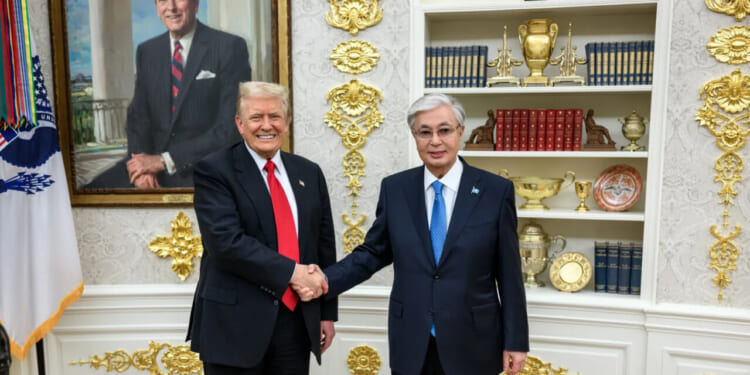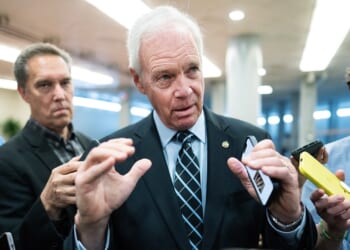Kazakhstan is not interested in joining a Middle Eastern alliance, but rather signaling its autonomy to Russia.
At last week’s US-Central Asia summit, Kazakhstan announced that it will become the first Central Asian nation to join the Abraham Accords, the US-brokered normalization agreement between Israel and Arab and Muslim nations initiated during Trump’s first term.
The decision represents an achievement for the second Trump administration’s foreign policy. It also confirms a prediction made in these pages last August: that Kazakhstan, the most plausible Central Asian candidate for accession to the accords, might join them to secure diplomatic benefits from Washington.
This perspective is precisely what some Western analysts are seizing upon. As Joseph Epstein, director of the Washington-based Turan Research Center at the Yorktown Institute, told Radio Free Europe/Radio Liberty, this step by Kazakhstan may seem symbolic. However, in the future, it may carry diplomatic weight: “Astana’s decision to join the Abraham Accords marks the beginning of a new stage, transforming these agreements from a Middle East peace initiative into a pro-American coalition of moderate Muslim countries committed to the ideas of tolerance and prosperity.”
Yet, to interpret this move through the lens of Middle Eastern politics or a nascent “pro-American coalition” is to miss its entire strategic purpose. The Abraham Accords are merely a tool for Astana’s calculated effort to diversify its geopolitical dependencies away from Moscow and cement a strategic relationship with the United States. Viewing it as the start of a new, ideologically defined bloc misreads the fundamentally pragmatic and self-interested nature of Kazakhstan’s calculus.
A Crowded Stage Where Kazakhstan Has No Role
Proponents of the accords’ expansion may cast it as part of a broader strategy to build a new geopolitical coalition against Iran. But this argument collapses under a closer scrutiny of Central Asian realities.
Iran holds no meaningful influence in Kazakhstan. The two nations share no border (except the shared usage of the Caspian Sea, alongside Russia, Azerbaijan, and Turkmenistan) and have limited trade.
The Islamist threat perceived by Astana’s security apparatus stems overwhelmingly from Salafist extremism and Taliban influence, both Sunni phenomena with roots in the Gulf and Afghanistan, not from Shia Iran.
Israel’s calculus could also be to draw Kazakhstan and other Central Asian states away from too close an association with Turkey, another rival, not just Iran. But that gambit would be a highly dubious long-term proposition, as Ankara strengthens relations with the Turkic Sunni Central Asian nations through institutions like the Organization of Turkic States. To portray Kazakhstan’s accession as a cornerstone of a new anti-Iranian or anti-Turkish coalition is to force a Middle Eastern framework onto a Central Asian reality, fundamentally misreading the landscape.
The truth is more straightforward and stark: Kazakhstan lacks the networks, expertise, credibility, and power—both soft and hard—to play a meaningful role in the crowded theater of Middle Eastern diplomacy. It possesses none of Turkey’s or Iran’s historical sway, Saudi Arabia’s religious authority, or the UAE’s and Qatar’s financial clout. For a nation that has meticulously avoided foreign entanglements, the suggestion that it seeks a stake in the Israeli-Palestinian conflict is implausible. President Tokayev himself conceded the point, acknowledging to The Washington Post’s Ishaan Tharoor that he expects no “practical results” from the accords. His description of the move as a “modest contribution” is a diplomatic nicety that acknowledges this reality.
Despite this, Israel can count Kazakhstan’s accession as a relative success. While primarily a gesture to Washington, it demonstrates diplomatic resilience. Despite the original accords being frozen and the big prize—an agreement with Saudi Arabia—remaining elusive due to the war in Gaza, no country has exited the Abraham framework. A new member joining shows that these nations still see tangible benefit in maintaining relations with Israel, despite the growing criticisms of Israeli actions in the Middle East and beyond.
The Real Audience: Washington and Moscow
The true explanation for Kazakhstan’s move lies in a nuanced shift in great-power diplomacy. For years, engagement with Central Asia has been framed through a “Great Game” cliché—a zero-sum chessboard pitting Washington against Moscow and Beijing.
At the summit with the Central Asian leaders, Washington’s approach was notably different. In a departure from past practice, the summit did not center on lecturing Central Asian leaders over values, democracy, or human rights. This was diplomatically shrewd. Historically, such values-talk was raised only perfunctorily, without meaningful follow-up or commitment, rendering it ineffective from both a values and interests perspective.
More importantly still, American officials did not pressure Central Asians to choose sides.
This deliberate restraint provided those leaders, bound by what Peter Leonard, a seasoned regional watcher, calls “unshakeable economic and infrastructural ties” to Russia and China, with the political space to engage the US without overtly challenging Moscow or Beijing.
Tokayev, a seasoned diplomat, seized this opportunity with a stroke of pragmatic statecraft.
Joining the Abraham Accords is a low-cost, high-yield signal. Kazakhstan established diplomatic relations with Israel in 1992. The accords require no new security commitments and, as Tokayev firmly stated, the decision to join them is “absolutely firm and irreversible.” When asked if even West Bank annexation or the expulsion of Gaza’s population could reverse the decision, he was unequivocal: “Nothing serious or terrible is going to happen that will make us change our decision.” The value of the commitment is entirely insulated from the fate of the Middle East because its true objective lies elsewhere.
Since the Russian invasion of Ukraine, Tokayev and other Central Asian leaders have accelerated their traditional “multi-vector” foreign policy into an urgent “diversification” drive. By joining the Abraham Accords, Kazakhstan hopes to gain goodwill in Washington, position itself as a potential partner for investment and strategic dialogue, and signal its autonomy from the Kremlin—all without having to confront its powerful northern neighbor openly.
The move is not about Israel, Iran, Turkey, or Middle Eastern peace. It is a strategic maneuver in Astana’s primary and most vital foreign policy project: ensuring its own sovereignty and freedom of action in a world increasingly divided between great powers.
While the profuse praise Central Asian leaders lavished on President Trump may have induced cringe in Moscow, sober Russian analysts like Sergey Markedonov reckon with the reality of diversification and advocate for Russia to seek beneficial outcomes within that framework, rather than quixotically fighting it. And for the United States, the lesson is that sometimes the most effective diplomacy involves creating frameworks that incentivize other nations to move toward Washington, rather than bluntly demanding they choose sides or hectoring them on democratic ideals.
About the Author: Eldar Mamedov
Eldar Mamedov is a non-resident fellow at the Quincy Institute and a member of the Pugwash Council on Science & World Affairs, a Nobel Peace Prize–winning Track II diplomacy organization committed to pursuing a world free of nuclear weapons and other weapons of mass destruction. Eldar has more than 30 years of professional foreign policy experience as a Latvian diplomat and senior foreign policy adviser in the European Parliament.
Image: White House / Public Domain.


















